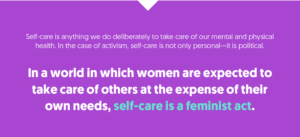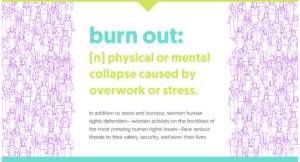In 2011, I visited Panzi Hospital in Bukavu, eastern Democratic Republic of Congo. That was before all the world attention, before it’s founder Congolese gynecologist and human rights activist, Dr. Dennis Mukwege became a Nobel Peace laureate. The hospital is known for their incredible work and response to sexual violence and innovations in gynaecological surgery and fistula repair in a region that has borne the brunt with long running complex conflicts in Eastern DRC. In most of these conflicts, sexual violence has been deployed as a tactic of war and the hospital recieves thousands of women, girls, boys and men whose bodies and minds are in dire need of high standard care after such inhumane violation.
I joined a team of psychologists who were there to assess the emotional health needs of the staff at the hospital. We spent time with the healthcare workers, who everyday are exposed to the ugliest of our humanity, to repair a bodies of women and girls, some as young as five months. They opened up about their own struggles and this was a well appreciated intervention, one which ought to be regular to provide frontline workers a way to deal with secondary traumatisation-vicarious trauma.
In a short blog post that took me more weeks to put together than usual, I recounted my interactions with health workers.
“They shoulder the burden of having to listen. If you have experienced war trauma or dealt with communities out of war, one of the most challenging but necessary things is having to listen to the horror stories. Some people say it’s easier to just forget but they really never forget. For health workers, they have to listen in order to heal others, but who listens to them?”
This was one of the most emotionally challenging work trips I have ever taken. I really struggled with all the stories of health workers and the people they had treated yet every night and weeks after. These health workers lived with these experiences everyday for long before the world recognised that they too need care. It was here that I was really made to understand the importance of self care for frontline human rights defenders, be it in health workers or everyday activist helping victims of various abuses in our societies.

Engaging in everyday agitation and advocating for the rights of people who have none and those who have been violated, exposes rights defenders to the very pains they are trying to eliminate. Effective organising and social movement building requires one to embed themselves in the struggles they may not suffer personally but which are very well interconnected to your own.
Audre Lorde said, “there is no such thing as a single-issue struggle because we do not live single-issue lives.”
And this means in a single day we might find ourselves taking on so many issues that in the end it can generate feelings of being overwhelmed. But understanding the interconnectedness of these issues is key to knowing that you don’t have to be at the core of every issue but rather find ways to support those taking on the different issues that takes into account your own capacity.
In this work on gender based violence, sometimes we might go out to help one woman and their experiences awaken our own, which might have been suppressed or overlooked. Preparing ourselves to engage very important, for both the activist and the people we are fighting for. To what extent is your own experience pushing you to this issue- this can be good or overshadowing or overwhelming in the face of the victim’s own experience. We have to constantly check in on ourselves and those we work around to find out if we are still inspired to fight on or we need a healthy detachment for your own well being?
Triggers are common in this work and we often don’t talk about them and how to handle them.
In this digital age, where you don’t necessarily have total control on what you see, where there are trolls and victim blaming right on your timeline, it can be particularly hard for victims of gender -based violence and those fighting everyday to eliminate it. Solidarity online is as important as it is in person. We don’t have to respond to every denier of our experiences, remember you are not alone and the behaviour flourishes in many ways. Gendered violence is upheld by a structure and these individual deniers represent that patriarchal power structure. For me, it helps to have a support system that I open about struggles, who will take on the fights I cannot.

Whether you are a journalist, a lawyer or a social worker, the struggles can seem overwhelming and sometimes it is difficult to even see progress. Often times the society regresses on the very rights that we have been assured for so long. It helps to remember that social progress and transformation does take time, be kind to yourself and those with whom you are struggling with.
We have to strive to make “self and collective care a daily political act.” You have to not simply survive. To live, in spite of the emotional oppression is the core of resisting. Personally I love stories, not just as work but actual in person conversations about silly, insignificant things in life. I have friends scattered in different parts of the world so I am known to call people randomly at awkward hours to just talk about random stuff. I like to travel-travel allows a mind switch and be present in that given space which often re-energizes me. It also helps to connect the dots of struggle and achievement from your home to other parts of the world.
I love reading books- it allows me to imagine a whole different reality than what I may be stuck in. I love dancing so if dancing is not part of it, then my experience in your city will be very much incomplete. I am a well known master of sleep- it’s a privilege, I know. So any lack of sleep for me is a flag to check on my health, emotional and physical. To care for one’s self is not self indulgent, it is very core of the struggle.
As a collective we must pay attention to each other’s mental health. Women’s human rights defenders’ work environments must take into account our different capacities, provide time for breaks, to heal and to reconnect with ourselves. On top of this work, women do uphold their own families, not just materially but often times carry the burden of emotional care.
To recognize when you are giving more than you receive especially to family and friends is important. Being cognizant of this inequality and how it impacts on women’s work should help us find ways to create our own peace. Find your communities who support you, figuring out activities that can take your mind off and replenish your energy source.
This article is published as part of an online campaign on self and collective care by the regional Gender Based Violence Prevention Network, coordinated by the Uganda-based organisation Raising Voices. Join the conversation #StrongerMovements.
